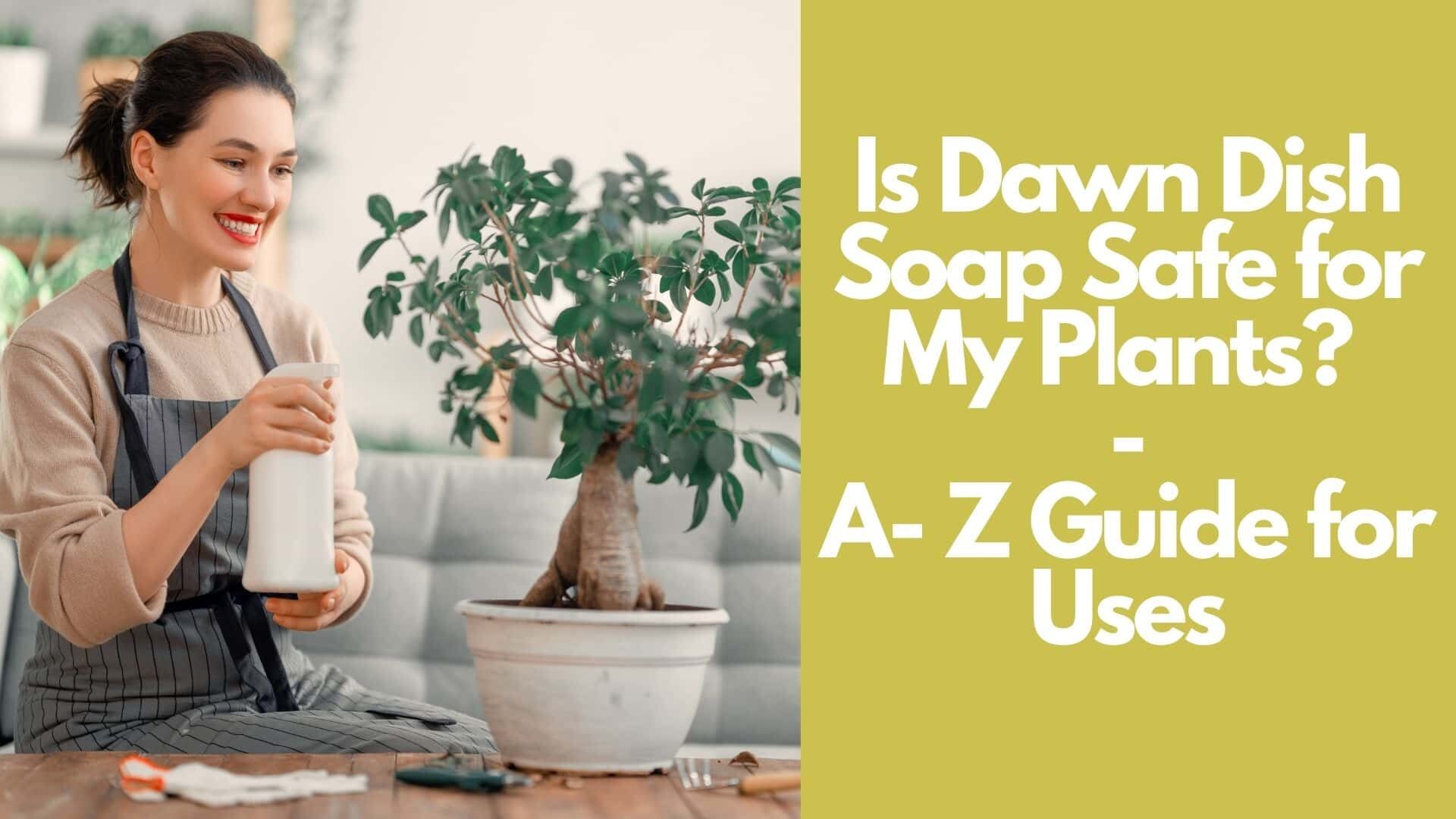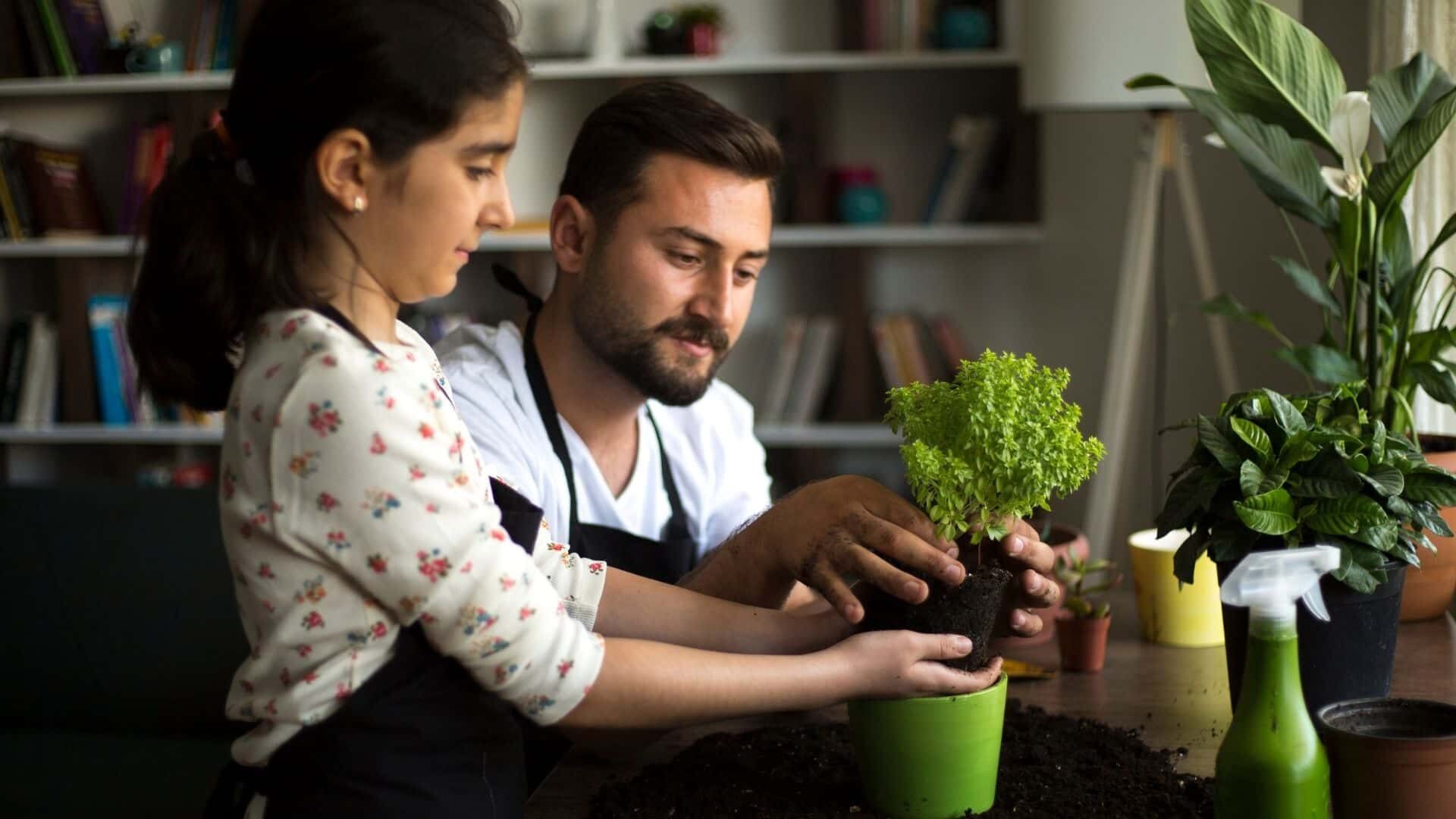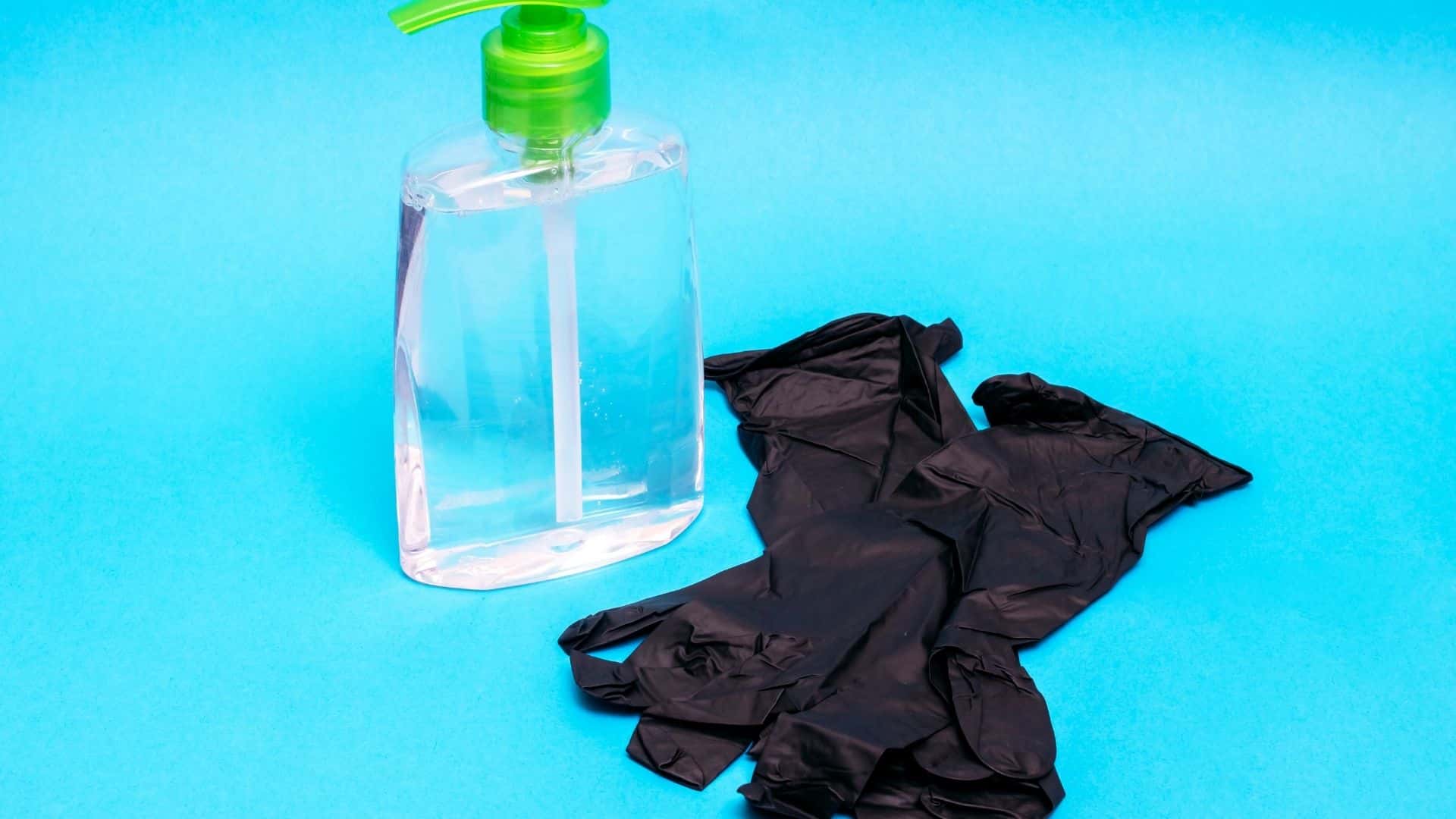Is Dawn Dish Soap safe for my plants? Dawn is a well-known brand of dish soap that you probably have in your kitchen. Do you know that they can use in your garden? Pest control is the primary benefit of this dawn dish soap. Using a small amount of Dawn dish soap in water is safe for plants.
Choosing a Dawn type with as few additives as possible can ensure a healthy plant. Without fragrance or other additives, the soap is the best. When horticultural pests come into direct touch with Original Scent Dawn dish soap diluted in water, they die. Soapy water is good to remove an insect’s protective coating, causing it to dry up and die.
Once the soapy water has dried, it has lost its effectiveness against garden pests and should wash from the plant. Dawn dish soap is highly regarded by many gardeners for its beneficial effects. By reading this guide, you will be able to know, Is Dawn Dish Soap Safe for My Plants?.

Let’s start,
Can I use Dawn Dish Soap to keep plants healthy?
Using a tiny amount of Dawn dish soap in water is safe for plants. Harmful chemicals in high quantities can kill plants. It is better to select a Dawn product that has few chemicals for smell or cleaning purposes,
With care, you can use Dawn dish soap to kill plant pests. Using too much cuticle remover might be hazardous to plants and cause cuticle disintegration. The absence of the cuticle makes the plant dry and prone to disease and pest invasion.
Soap may stay in the soil, poisoning nearby plants. Horticultural soaps are far safer than human soaps. It kills bugs without hurting the leaves. However, using the right amount of dawn dish soap, safe for your plants.
How does Dawn Dish Soaps work to keep pests and insects away?
Before using Dawn dish soap, you need to know what bugs are attacking your plant. Dawn dish soap mixed with water can use to get rid of various bugs such as,
- Aphids
- Whiteflies
- Japanese beetles
- Thrips
- Spider Mites
- Mealybugs
- Psyllids
- Grasshoppers
- Ants
- Leafhoppers
- Scale insects
- Rose slugs
How to make homemade organic insecticide with dawn dish soap?
All the gardeners want a plant-healthy solution. Keep the strength of Dawn dish soap at 2%. Soaps with citric acids, such as those containing lemon or lime, should avoid.
Dishwasher soap, laundry detergent, or dry soap never substitute for Dawn dish soap. These do not eliminate insects, and as a result, they may do severe damage to your plants. You can use Original Scent Dawn dish soap in the blue bottle.
Insecticides made with hard water will not work. If your dishwasher-cleaned cutlery has spots or your freshly laundered garments have stains, so you have hard water. In the case of hard water, use distilled or bottled water instead of tap.
Pour 1 gallon of water and 2 1/2 teaspoons of Dawn dish soap into a measuring cup to make a 1% Dawn solution. For each percentage point increase in strength, add 2 1/2 tablespoons of additional liquid. To make a smaller quantity of soapy water, use 1/4 of the soap listed above in 1 quart of water.
Alternately, one tablespoon of Dawn can mix with one cup of cooking oil and then add to a gallon of water.
How to apply insecticidal soap to my plants?
The best time to use the spray is if you know it will be dry that day, so check the forecast. Unless it rains before then, the spray will wash away.
Make sure it’s not too hot outside at this time of day. If it’s a sunny day, your Dawn spray will dry quickly, burning the plant. If you’re spraying pesticides on indoor plants, you can do so at any time of day or night.
Insect-damaged plants are a good place to start. Spray Dawn all over the plant from top to bottom. It should cover all of its buds and blossoms, as well as the tops and bottoms of its leaves. The solution can apply straight to bugs if found. There must be direct contact between the insecticide and the bug for it to be effective. After drying, it ceases to work.
Rinse your plants with fresh water when the spray solution dries to ensure their safety. It is important to continue this treatment every week or two until the insect problem is resolved.
This spray will kill any bugs crawling on your plants, but it will not prevent more bugs from appearing in the future. If fresh bugs appear, use the Dawn spray to kill them.
What are the other uses of dawn dish soap for plants?
Apart from controlling pests and insects, you can use dawn dish soap for keeping your garden healthy and productive. There are some benefits of using Dawn dish soap in your garden such as,
1. Wet the hydrophobic soil.
Pour 10 parts water into a can, add 1 part dawn dish soap, and slowly pour the solution on top of the hydrophobic soil. This should help it absorb more water.
Dry soil surface tension can break using detergent, allowing water to be absorbed. If the hydrophobic situation recurs, this hack can use to treat it.

2. Clean driveway stains.
A mixture of non-clumping kitty litter and dawn dish soap with warm water can use to clean your driveway of any remaining gasoline or oil stains. Dish soap can apply immediately to the patch and allow to sit for an hour before cleaning.
3. Kill the weeds.
If you’re having trouble maintaining your garden weed-free, try this hack. Kill the undesirable plants with the same Dawn dish soap solution.
2-4 cups white vinegar, 2-3 tablespoons dawn dish soap, and 1 cup salt Fill a clean bottle with the solution and spray on weeds when there is no rain anticipated.
4. Remove sap from trees.
Gardeners frequently come to contact with sticky tree sap while pruning trees. To remove the sticky sap from your hands, use Dawn dish soap. Scrub with dawn liquid soap and water.
5. Clean dirty hands.
It’s possible to have your hands covered with dirt, grease, or paint after a gardening outing or painting planters, and it’s difficult to remove.
Apply a mixture of dawn dish soap and maize oil to the afflicted areas and rub it in. Your skin will be softer after using this solution to remove the grease and paint.
6. Clean garden tools.
To ensure that your gardening tools survive as long as possible, they must clean well after each use.
Add ½ of a cup of dawn dish soap to a bucket full of water, mix the solution, and put the tools in it for an hour. Gently scrub them with a brush, then rinse and wipe them off with a fresh cloth.
Which plants don’t handle dawn dish soap well?
There are some plants that don’t like dawn dish soap because they are sensitive. So, It is better to not use dawn dish soap for the following plants.
1. Gardenia
An evergreen shrub with fragrant flowers and glossy, dark green foliage, the gardenia is easy to care for. It’s a tropical plant that requires a little more attention to thrive.
2. Impatiens
Impatiens are joyful annuals that can brighten up any shaded area of your yard with their vibrant colors. Impatiens can be grown in a relatively short period.
3. Cherry Trees
There are two reasons why cherry trees are planted. In many cases, cherry trees are grown as a result of their excellent fruits. In some cases, people plant cherry trees because they are gorgeous in the springtime when they bloom.
4. Nasturtiums
Nasturtium is a cheery and easy-to-grow plant. They are a wonderful companion plant for kids to plant because of their bright, delicious leaves, blossoms, and seedpods.
5. Sweet Peas
Only sweet peas have a long-lasting attraction and bucolic beauty. There’s something so peaceful about the way they sprawl across a rustic trellis, seemingly defying our fast-paced lifestyles.
6. Azaleas
In the spring, nothing beats the beauty of an azalea plant in full bloom. It’s nearly impossible to find a color that doesn’t fit your needs with these low-maintenance bushes. An easy-to-grow plant, azaleas bring instant life and vibrancy to even the most barren of gardens.
7. Begonias
Begonias are native to tropical and subtropical regions and are commonly used as houseplants and in shady summer beds. The asymmetrical, patterned, and variegated leaves of some cultivars are prized, while the vivid blossoms of others brighten up shady garden spaces.
8. Plum Trees
You can’t go wrong with plums in your garden. Plum trees are both satisfying and delicious to grow. Plums are delicious both raw and cooked, and they may be preserved in a variety of ways, including jams and jellies.
9. Fuchsias
Fuchsias, with their multicolored flowers that dangle gracefully from baskets, planters, and pots, come in thousands of different types and colors. Fuchsia plants can be either bushy or vine-like and trailing when trellised in the garden.
10. Japanese Maple
In addition to being an eye-catching focal point, Japanese maple trees make excellent container plants and can be trained to grow into magnificent bonsai trees.
Top 6 Natural ways to keep your plants safe
Here are the best natural ways to keep your garden safe.
1. Eggshells
This procedure works well for slugs, snails, and caterpillars. Crushed eggshells will be like razorblades to these green eaters’ sensitive underbellies. After removing the infected leaves and insects, scatter the shells over the plants to discourage re-infestation.
2. Mulch
Mulching your garden has numerous benefits. It keeps the soil cold and inhibits weed development. Insects will avoid your plants because of the odor. Mulch can also keep larger creatures like rabbits and squirrels away from your garden.
3. Marigolds
This is an old trick. Marigolds contain a smell that repels most pests. Plant a row around the garden’s perimeter to benefit your plants.
4. Neem oil
Neem oil is a byproduct of the Neem tree and is effective against a variety of garden pests. Many garden centers carry it.
5. Companion Planting
Prevention is the key to a healthy garden, just as it is too good health for the human body. Natural insect repellents like Allium, Chrysanthemum, Garlic, Marigolds, Onions, and Petunias help to keep pests at bay.
6. Vinegar
Slugs, moths, and ants can deter with a simple vinegar solution. Industrial vinegar with a greater acid concentration (at least 20%) will damage your blossoms.
Watch Improved Soapy Water Insecticide Spray: Dawn Dish Soap | Video
Top 5 FAQs & answers related to Is dawn dish soap safe for my plants?
What about plants with Palmolive dish soap?
It is okay for plants to use Palmolive dish soap combined with water in a small amount. Choose a variety with few additives as possible to avoid damaging the plant in the long run. Soap that is unscented and unadulterated is the finest option.
Are plants safe from Baby Shampoo?
You should use baby shampoo because it contains no colors, fragrances, antibacterial agents, or any other chemicals that could harm microbes living in your soil. They’re also pH-balanced, so they don’t affect the pH of your soil.
Is Dawn harmful to tomato plants or not?
Dry laundry or dish detergents are too powerful for plant usage, and even liquid laundry soap solutions can harm some tomato species. Water your tomato thoroughly and spray a few of its leaves to confirm that it is safe.
Can you clean plant leaves with Dawn dish soap?
Plant leaves can clean with Dawn dish soap. Mix one liter of lukewarm water with 1/4 teaspoon of the soap. Spritz the leaves with this mixture and wait a few moments.
After that, use a moist towel to gently wipe down the leaves to eliminate any remaining soap residue. To avoid spots caused by remaining water and soap, apply this to smooth, hairless leaves.
How to make potassium soap for plants?
Using a container of your choice, fill it with hot water (the heat helps to dilute the soap). Pour in a small amount of soap and mix well. Then, add the vinegar and 96-proof alcohol to the pot. Stir well. Ensure that the final product is uniform by mixing it thoroughly one more time.
Conclusion
By reading this guide, I hope you got the full idea of Is Dawn Dish Soap Safe for My Plants: Guide with Effects.
Please share this Is Dawn Dish Soap Safe for My Plants: Guide with Effects with your friends and do a comment below about your feedback.
We will meet you on next article.
Until you can read, How Can I Compost Corn Cobs and Feed THem to Plants: Guide
